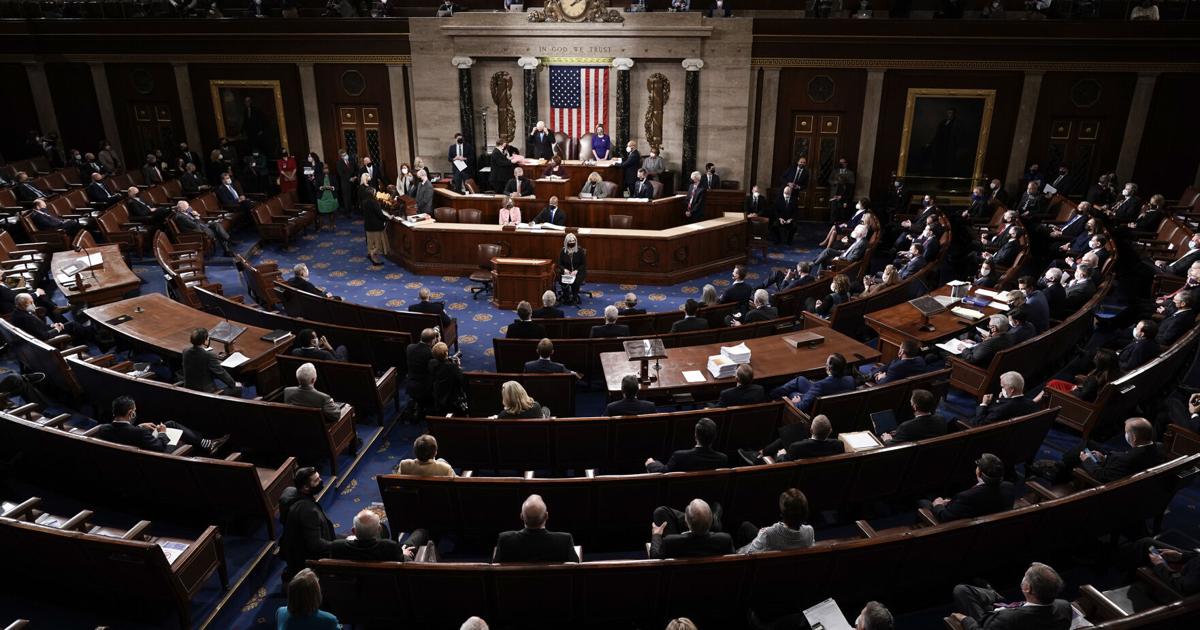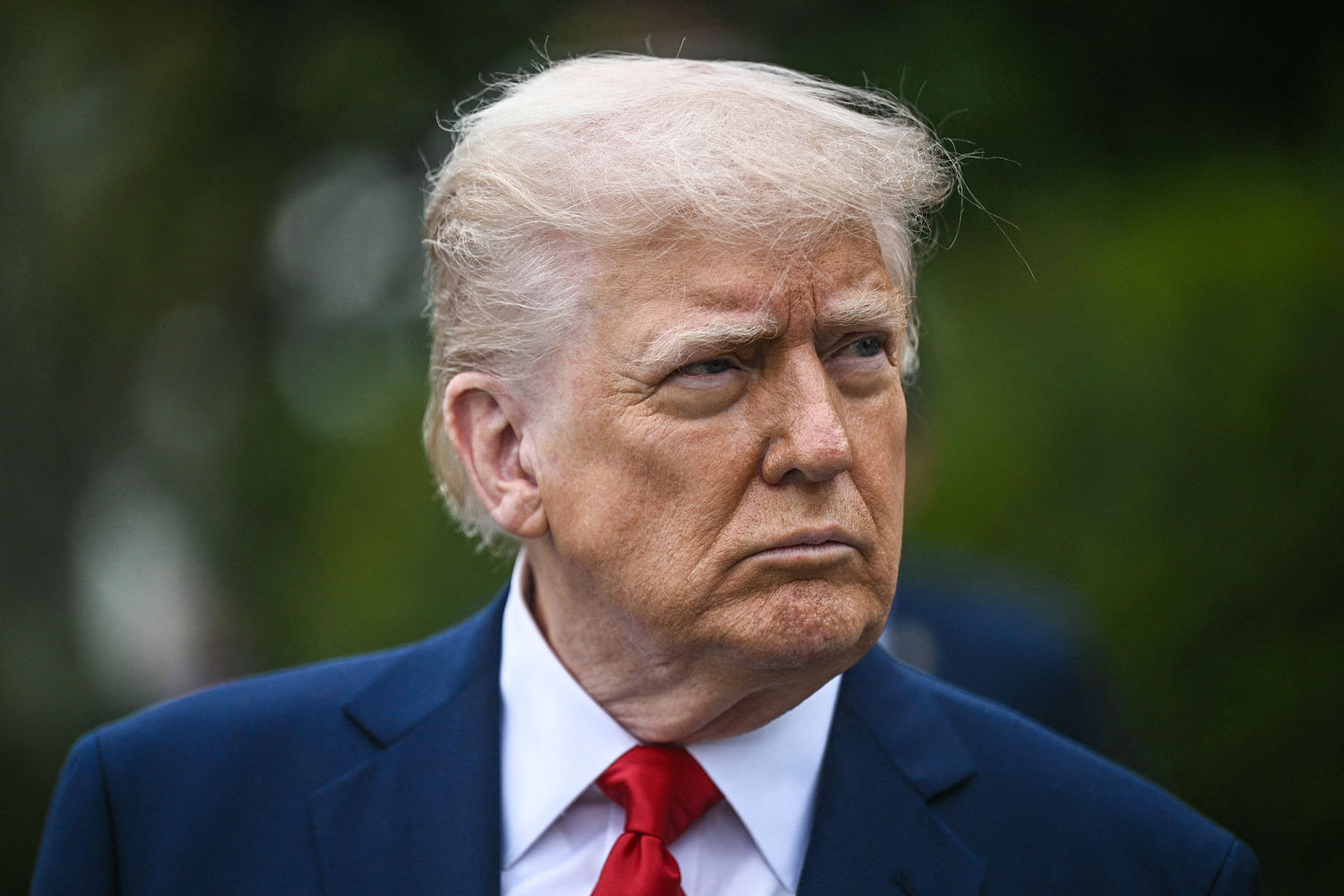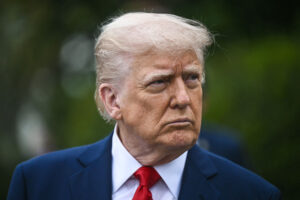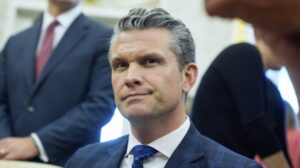The Dictatorship
Congress is ready to certify Trump’s election win, but his Jan. 6 legacy hangs over the day

WASHINGTON (AP) — Congress certified President-elect Donald Trump as the winner of the 2024 election in proceedings Monday that unfolded without challenge, in stark contrast to the Jan. 6, 2021, violence as his mob of supporters stormed the U.S. Capitol.
Lawmakers convened under heavy security and a winter snowstorm to meet the date required by law to certify the election. Layers of tall black fences flanked the Capitol complex in a stark reminder of what happened four years agowhen a defeated Trump sent rallygoers to “fight like hell” in what became the most gruesome attack on the seat of American democracy in 200 years.
The whole process this time concluded swiftly and without unrest. One by one, a tally of the electoral votes from each state was read aloud to polite applause in the House, no one objected and the results were certified.
“Today, America’s democracy stood,” Vice President Kamala Harris, a Democrat, said after presiding over the session — as is the role of her office — and her own defeat to Trump.
But Trump’s legacy from 2021 leaves an extraordinary fact: The candidate who tried to overturn the previous election won this time and is legitimately returning to the White House, his inauguration in two weeks.
While Monday’s outcome revived a U.S. tradition that launches the peaceful transfer of presidential power, what’s unclear is if Jan. 6, 2021, was the anomaly or if this year’s calm becomes the outlier.
Trump denies that he lost four years ago, muses about staying beyond the Constitution’s two-term White House limit and promises to pardon some of the more than 1,250 people who have pleaded guilty or were convicted of crimes for the Capitol siege. He calls Jan. 6, 2021, a “day of love.”
Trump said online Monday that Congress was certifying a “GREAT” election victory and called it “A BIG MOMENT IN HISTORY.”
Still, American democracy has proven to be resilient, and Congress, the branch of government closest to the people, came together to affirm the choice of Americans.
With pomp and tradition, the day unfolded as it has countless times before, with the arrival of ceremonial mahogany boxes filled with the electoral certificates from the states — boxes that staff were frantically grabbing and protecting when Trump’s mob stormed the building last time.
Senators walked across the Capitol — which four years ago had filled with roaming rioters, some defecating and menacingly calling out for leaders, others engaging in hand-to-hand combat with police — to the House to begin certifying the vote.
The House chaplain, Margaret Kibben, who delivered a prayer during the violence four years ago, made a simple request as the chamber opened to “shine your light in the darkness.”
Harris stood at the dais where then-Speaker Nancy Pelosi was abruptly rushed to safety last time as the mob closed in and lawmakers fumbled to put on gas masks and flee, and shots rang out as police killed Ashley Babbitta Trump supporter trying to climb through a broken glass door toward the chamber.
And Harris certified her own defeat — much the way Democrat Al Gore did in 2001, Republican Richard Nixon did in 1961 and then-Vice President Mike Pence did four years ago.
When Harris read the tally, the chamber broke into applause: first Republicans for Trump’s 312 electoral votes, then Democrats for Harris’ 226.
Vice President-elect JD Vance had joined his former Senate colleagues in the front row, and was surrounded afterward with congratulatory handshakes, hugs and photos.
Congress certified President-elect Donald Trump as the winner of the 2024 election in proceedings that unfolded without challenge, in stark contrast to Jan. 6, 2021. Vice President Kamala Harris read the tally, including of her own defeat.
Within half an hour the process was done.
There are new procedural rules in place after what happened four years ago, when Republicans echoed Trump’s lie that the election was fraudulent and challenged the results their own states had certified.
Under changes to the Electoral Count Actit now requires one-fifth of lawmakers, instead of just one in each chamber, to raise any objections to election results.
But none of that was necessary.
Republicans who challenged the 2020 election results now express greater trust in U.S. elections after Trump defeatedHarris.
Rep. Andy Biggs, R-Ariz., who led the House floor challenge in 2021, said people at the time were so astonished by the election’s outcome and there were “lots of claims and allegations.”
This time, he said: “I think the win was so decisive. … It stifled most of that.”
And Democrats frustrated by Trump’s victory nevertheless accepted the choice of the American voters, with House Democratic Leader Hakeem Jeffries saying his side of the aisle is not “infested” with election deniers.
“There are no election deniers on our side of the aisle,” Jeffries said last week on the first day of the new Congress, to applause from Democrats in the chamber.
Harris said afterward that Jan. 6 this time was “about what should be the norm and what the American people should be able to take for granted, which is one of the most important pillars of our democracy: the peaceful transfer of power.”
Last time, far-right militias helped lead the mob to break into the Capitol in a war zone-like scene. Officers have described being crushed and pepper-sprayed and beaten with Trump flag poles, “slipping in other people’s blood.”
Leaders of the Oath Keepers and Proud Boys have been convicted of seditious conspiracy and sentenced to lengthy prison terms. Many others faced prison, probation, home confinement or other penalties.
Pence, who had been rushed into hiding that day as rioters threatened to hang him for his refusal to reject Biden’s win, wrote online that he welcomed what he called “the return of order and civility” to the certification process.
Trump was impeached by the House on the charge of inciting an insurrection that day but was acquitted by the Senate. At the time, GOP leader Mitch McConnell blamed Trump for the siege but said his culpability was for the courts to decide.
Federal prosecutors subsequently issued a four-count indictment of Trump for working to overturn the election, but special counsel Jack Smith withdrew the case last month after Trump won reelection, adhering to Justice Department guidelines that sitting presidents cannot be prosecuted.
Biden, in one of his outgoing acts, awarded the Presidential Citizens Medal to Rep. Bennie Thompson, D-Miss., and former Rep. Liz Cheney, R-Wyo., who had been the chair and vice chair of the congressional committee that conducted an investigation into Jan. 6, 2021.
Trump has said those who worked on the Jan. 6 committee should be locked up.
___
Associated Press writers Fatima Hussein and Ashraf Khalil contributed to this report.
The Dictatorship
Trump walks back campaign promise on Russia-Ukraine war: ‘I said that figuratively’

Donald Trump sat with Time magazine earlier this week for a wide-ranging interview on the first 100 days of his second administration. The hourlong discussion touched on a variety of hot-button issues, including the president’s deportation efforts, his administration’s controversial cuts to federal agencies and his compliance — or possibly lack thereof — with court orders.
Here are five key moments from the interview.
‘I’m not defying the Supreme Court. I never defy the Supreme Court. I wouldn’t do that.’
When asked whether he would commit to complying with court orders, Trump told Time multiple times that he would.
“Sure, I believe in the court system,” the president said.
But Trump balked when confronted about his administration’s refusal to follow a Supreme Court order instructing the government to facilitate the return of Kilmar Abrego Garcia to the U.S. after he was mistakenly deported to El Salvador last month.
“Well, that’s not what my people told me,” he said when asked whether he was disobeying the justices, adding: “I leave that to my lawyers. I give them no instructions. They feel that the order said something very much different from what you’re saying. But I leave that to my lawyers.”
Asked if he would be violating his oath of office if he defied the Supreme Court, Trump said: “I’m not defying the Supreme Court. I never defy the Supreme Court. I wouldn’t do that. I’m a big believer in the Supreme Court, and have a lot of respect for the justices.”
‘I said that figuratively.’
Trump apparently expects his voters to know when he’s being serious and when he’s just speaking “figuratively,” as he claims he was when he vowed repeatedly during his 2024 campaign to end the Russia-Ukraine war on Day 1 of his second term.
“Well, I said that figuratively, and I said that as an exaggeration, because to make a point, and you know, it gets, of course, by the fake news [unintelligible],” Trump told Time when asked about the campaign promise. “Obviously, people know that when I said that, it was said in jest, but it was also said that it will be ended.”
He seemed to hedge his bets on when and how the brutal war would come to an end in his subsequent comments: “The war has been raging for three years. I just got here, and you say, ‘What’s taken so long?’”
‘I don’t believe in loopholes.’
Trump has hinted at a potential run for a third term for several months — even though the Constitution forbids it. When asked what methods he’s considering in attempting to pursue such a bid, Trump said: “I’d rather not discuss that now, but as you know, there are some loopholes that have been discussed that are well known. But I don’t believe in loopholes. I don’t believe in using loopholes.”
Some have floated the possibility of Trump joining the 2028 ticket as JD Vance’s running mate, so Vance could resign if they won and Trump could become president for a third term. But Trump told Time, “I don’t know anything about” that possibility.
Meanwhile, the Trump Organization appears to be full steam ahead on a possible third Trump term.
‘I would love to do that if it were permissible by law. We’re looking into that.’
Despite the backlash to and illegality of such a fantasy, Trump doubled down on his wish to send some criminals who are U.S. citizens to foreign prisons, telling Time that his administration is “looking into that.”
“I would love to do that if it were permissible by law,” Trump said, adding: “We’re talking about career criminals that are horrible people that we house and we have to take care of for 50 years while they suffer because they killed people. If you ask me whether or not I would do that, I would, but totally, and I think you have to leave this part of the sentence totally subject to it being allowed under law. And people are looking to see if it would be allowed under law.”
It’s not legal to deport U.S. citizens. Period.
‘There’s never been a group of people that’s been treated so horribly as the J6 people.’
Trump defended his decision to grant sweeping clemency to all rioters involved in the Jan. 6, 2021, attack on the U.S. Capitol, suggesting they’ve been persecuted more than any other group of people.
His decision to pardon roughly 1,500 Jan. 6 defendants — including some who assaulted police officers and threatened to kill his vice president at the time — drew bipartisan backlash. But Trump is still feeling good about it.
“People do heinous acts, far more serious than what took place on Jan. 6,” he told Time. “And nothing happened to these people. Nothing. … There’s never been a group of people, maybe with one exception, I won’t even go into it, one exception as a group. But there’s never been a group of people that’s been treated so horribly as the J6 people.”
It’s unclear which possible “exception” he was referring to, but it’s fair to say many other groups have been treated far worse.
Hayley Miller is the senior blog editor for BLN. Previously, she was a senior reporter on HuffPost’s breaking news team. Before she was a reporter, she was a senior editor on HuffPost’s blog team.
The Dictatorship
The Kilmar Abrego Garcia case remains in a legal limbo during weeklong pause

Welcome back, Deadline: Legal Newsletter readers. Is the Trump administration working to bring Kilmar Abrego Garcia back to the United States? It sounds like an odd question at first, given the government’s stubborn stance in this case and others. But there was a mysterious development raising the possibility. Plus, yet another judge ordered yet another person’s return from El Salvador, all while lawyers for scores of people held in that nation’s notorious terror prison press a new claim for “urgent” relief.
Ahead of the mystery moveU.S. District Judge Paula Xinis blasted the government’s “willful and bad faith refusal to comply with discovery obligations.” (Discovery is the information-gathering process during litigation.) In an order Tuesday, Xinis assailed the Trump administration’s “continued mischaracterization” of the Supreme Court’s demand to facilitate Abrego Garcia’s release and “to ensure that his case is handled as it would have been had he not been improperly sent to El Salvador.” She told officials to answer his lawyers’ questions by Wednesday evening.
But then a sealed motion appeared Wednesday on Xinis’ docket. It was from the government, seeking a weeklong pause in the discovery fight. A sealed response from Abrego Garcia’s lawyers followed, and Xinis granted the motion. Crucially, she noted the pause was “[w]ith the agreement of the parties.” The details of the filings weren’t public, so we don’t know what each side said. But why would Abrego Garcia and Xinis agree to any delay if it’s not to get him back? The docket has been silent since Wednesday.
Meanwhile, another judge ordered the return of another man from El Salvador. U.S. District Judge Stephanie Gallagher sided with a 20-year-old going by “Cristian” in court papers who, she said, was wrongly sent to that country before his asylum application was processed. “Thus, like Judge Xinis in the Abrego Garcia matter, this Court will order Defendants to facilitate Cristian’s return to the United States so that he can receive the process he was entitled to,” Gallagher wrote.
But what about all the others shipped to El Salvador and loaded into a notorious prison without due process? Lawyers are now seeking their return, too. The motion is pending before U.S. District Judge James Boasberg, who found probable cause last week to hold Trump officials in contempt, which the administration is currently trying to appeal.
Speaking of Trump v. The Judiciary on immigration, his administration just escalated the war by arresting a Wisconsin state court judge whom the federal government alleged obstructed an immigration arrest. “No one is above the law,” Donald Trump’s attorney general, Pam Bondi, said upon the arrest of Milwaukee Judge Hannah Dugan. A statement on Dugan’s behalf said she “has committed herself to the rule of law and the principles of due process for her entire career” and “looks forward to being exonerated.”
Elsewhere in Law & Orderthree more federal prosecutors from the Eric Adams boondoggle resigned rather than betray their oaths. Deputy Attorney General Todd Blanche wanted them to admit wrongdoing in refusing to dismiss the case for Trump’s political aims, but they declined to “confess wrongdoing when there was none.” And one of the president’s latest clemency grants for a loyal supporter is memorably captured in The Associated Press’ headline: Trump pardons Nevada politician who paid for cosmetic surgery with funds to honor a slain officer.
The Supreme Court enters its final full week of hearings Mondayafter considering a request this week from parents to keep their elementary school kids away from instruction involving LGBTQ-themed books. The high court majority sounded ready to side with the parents’ religious appeal, while another big argument is set for Wednesday over a bid for the nation’s first public religious charter school internationality fact life. That would typically be the final hearing of the term, but remember that the justices set a rare May 15 hearing on birthright citizenshiptoo.
As always, emergency appeals will keep the court busy on immigration and more, with the administration this week adding another urgent filing seeking to enforce its transgender military service ban. We could learn next week if the court wants to help Trump out on that one — so far in his second term, his record is mixed at the court. What’s certain is that the appeals will keep coming.
Have any questions or comments for me? Please submit them on this form for a chance to be featured in the Deadline: Legal blog and newsletter.
Jordan Rubin is the Deadline: Legal Blog writer. He was a prosecutor for the New York County District Attorney’s Office in Manhattan and is the author of “Bizarro,” a book about the secret war on synthetic drugs. Before he joined BLN, he was a legal reporter for Bloomberg Law.
The Dictatorship
Government backtracks on revoked student visas but says ICE is working on new plan

The Trump administration on Friday reversed course on the revocation of visas for international studentsmaking an abrupt — if temporary — 180 on a policy that left more than a thousand foreign students scrambling and civil rights experts sounding the alarm about free speech.
At a hearing in the Northern District of California in Oakland, the Justice Department said visas for international students have been restored while it works up a new framework to review and cancel student visas, NBC News reported.
U.S. Immigration and Customs Enforcement is developing the new policy for status record termination, said U.S. attorney Elizabeth D. Kurlan during the hearing. Until that framework is in place, foreign students’ visas will not be terminated based solely on the government’s criminal records database, as was previously the case.
ICE, however, still has the authority to terminate international students’ records for other reasons, “including if a student fails to maintain their nonimmigrant status after it is reactivated, or engages in unlawful activity that would render them removable from the U.S. under the Immigration and Nationality Act,” Kurlan said.
The administration’s decision to terminate student visas for many foreign students — a decision that appeared to be linked in some cases to political activism or minor infractions like DUIs — was met with intense pushback in the courts. Some students said they were informed of the sudden change in status and ordered to “self-deport” with little noticeand colleges said they were given little to no information or reason for the revocations. Secretary of State Marco Rubio said in March that the government had already revoked 300 or more visas for students and other visitorsin part due to pro-Palestinian activism, and that the administration was doing it “every day.”
The visa terminations led to a bevy of lawsuits against the administration. Dozens of judges have since ruled against the governmentas least temporarily.
Still, some foreign students have already left the U.S., The New York Times reported. That includes Momodou Languagea British Gambian student at Cornell University whose visa was terminated in late March over his pro-Palestinian activism. Taal said in a statement at the time that he had “lost faith that a favourable ruling from the courts would guarantee my personal safety and ability to express my beliefs.”
Clarissa-Jan Lim is a breaking/trending news blogger for BLN Digital. She was previously a senior reporter and editor at BuzzFeed News.
-

 The Josh Fourrier Show6 months ago
The Josh Fourrier Show6 months agoDOOMSDAY: Trump won, now what?
-
Uncategorized5 months ago
Bob Good to step down as Freedom Caucus chair this week
-

 Politics6 months ago
Politics6 months agoWhat 7 political experts will be watching at Tuesday’s debate
-

 Politics6 months ago
Politics6 months agoHow Republicans could foil Harris’ Supreme Court plans if she’s elected
-
Economy6 months ago
Fed moves to protect weakening job market with bold rate cut
-
Uncategorized5 months ago
Johnson plans to bring House GOP short-term spending measure to House floor Wednesday
-

 Politics6 months ago
Politics6 months agoRFK Jr.’s bid to take himself off swing state ballots may scramble mail-in voting
-
Economy6 months ago
It’s still the economy: What TV ads tell us about each campaign’s closing message













